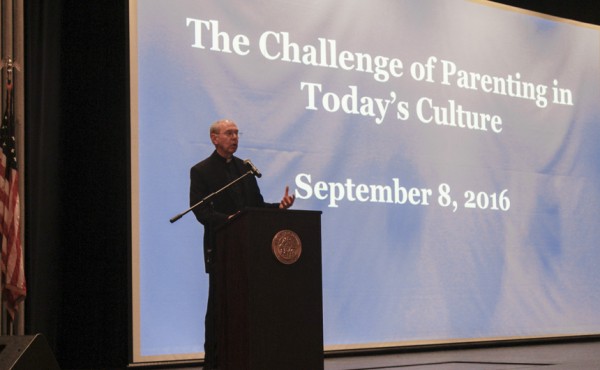Town Hall Meeting Encourages Jesuit-Parent Partnership Against Student Substance Abuse
On Sept. 8, Jesuit president Fr. Anothny McGinn, S.J., and prevention specialist Deirdre Flynn of FCD Prevention Works, a global nonprofit substance abuse prevention organization, led a Town Hall Meeting focused on parents’ role in helping their sons make healthy choices, especially with regard to avoiding alcohol and drugs. Coordinator of student assessment Donald Songy ’07 moderated the event, which was mandatory for parents of new students and open to all.
See the Town Hall Meeting Photo Gallery
Mr. Songy opened the meeting by outlining the Student Assessment Program’s mission to identify, support, and educate students whose behaviors seem to indicate family, academic, emotional, or social problems that could lead to negative consequences such as substance abuse. The program’s goal is to help these students avoid alcohol and drugs by providing the structure they need to make healthy decisions. As an adjunct to their grade-level counselor, Songy meets regularly with students in the program to discuss everything from relapse prevention and stress to grades and social problems. Songy concluded that it has been his privilege to watch students succeed in their sobriety.
The moderator then introduced Fr. McGinn, who noted the meeting’s central truth more here, that a child who reaches age 21 without smoking, abusing alcohol, or using drugs almost certainly will never experience issues with substance misuse. Fr. McGinn referenced this information from the founder of the Center for Addiction and Substance Abuse at Columbia University, Joseph A. Califano, Jr. While early adulthood is years away for most Jesuit students, Fr. McGinn empowered the audience to lay strong foundations now, reiterating parents’ mission to help their children develop into the people God intends them to become.
“You don’t have to be clueless or powerless, and I certainly hope you’re not complicit,” Fr. McGinn told parents.
He outlined obstacles that might impact students’ journeys, including early onset of alcohol consumption and prolonged adolescence, but stated that Jesuit and its parents form a partnership during the teenage years that can help their sons establish strong moral compasses, resilience, and sense of purpose.
As the presentation continued, Flynn detailed findings from a substance abuse attitudes and behavior survey recently taken by Jesuit students. She noted that the vast majority of respondents continue to hold positive beliefs, engage in responsible decision making, and exhibit healthy behaviors, an upward trend when compared to earlier surveys. However, the results also showed that — like most youth — students not only overestimate their peers’ alcohol and marijuana use, but also underestimate their abstinence from these substances. She called on parents to have consistent, open dialogue with their children about alcohol and drugs.
“Your sons are being bombarded with negative messaging,” Flynn said. “It’s never too early for you to start having talks with your kids. They don’t have to be long talks — lots of shorter ones help, too.”
The evening concluded with question and answer session.
For more information, parents might find the following resources helpful in talking with their children:
